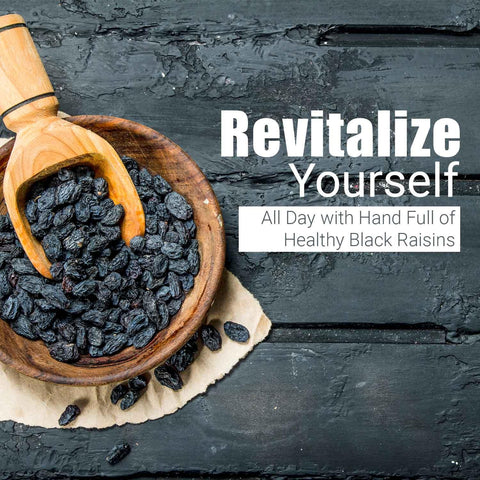Dry fruits are a popular choice for those seeking a nutritious and convenient snack option. They are fruits from which the majority of the water content has been removed, leaving behind a smaller, energy-dense package full of flavor, nutrients, and fiber. Including various types of dry fruits in your diet can provide numerous health benefits, from improved digestion to better heart health. Let's explore the different types of dry fruits, their benefits, and how they can be a tasty addition to your daily nutrition.
Types of Dry Fruits: Names in English and Hindi
|
English Name |
Hindi Name |
|
Kashmiri Mamra Almonds |
Kashmiri Mamra Badam |
|
Almonds |
Badam |
|
Cashews |
Kaju |
|
Dried Black Raisins |
Sukhe Kali Kishmish |
|
Dried Blueberries |
Sukhe Neelbadri |
|
Walnut Giri |
Akhrot Giri |
|
Dried Cranberries |
Sukhe Cranberries |
|
Raisins |
Kishmish |
|
Dried Anjeer (Figs) |
Sukhe Anjeer |
|
Pistachios |
Pista |
1. Kashmiri Mamra Almonds:
Kashmiri Mamra almonds are a premium variety of almonds known for their sweet taste and high nutritional content. Unlike regular almonds, they are cultivated in the valleys of Kashmir and are usually organic. Kashmiri Mamra Almonds are valued for their unique taste and higher oil content. They're a good source of healthy fats, protein, and fiber, making them a nutritious snack option.
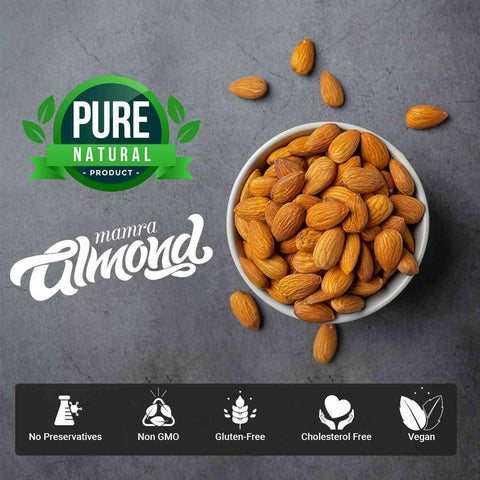
Benefits:
- Enhance cognitive function and memory.
- Rich in antioxidants, preventing cellular damage.
- Promote heart health and reduce cholesterol levels.
1 Ounce Serving:
- Calories: 160
- Protein: 6g
- Fat: 14g
- Carbohydrates: 6g
- Fiber: 3.5g
- Sugar: 1g
2. Almonds:
Almonds are versatile nuts known for their health benefits and culinary uses. They're a great source of protein, healthy fats, and fiber. Almonds are a popular choice worldwide due to their versatility and health benefits. They are excellent for heart health, skin, and hair due to their vitamin E content.
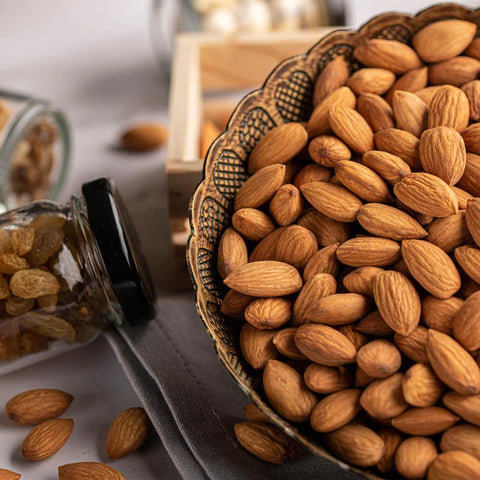
Benefits:
- Support heart health and prevent cardiovascular disease.
- Aid in blood sugar control and energy stability.
- Improve skin health due to their vitamin E content.
1 Ounce Serving:
- Calories: 164
- Protein: 6g
- Fat: 14g
- Carbohydrates: 6g
- Fiber: 3.5g
- Sugar: 1.2g
3. Cashews:
Cashews are kidney-shaped seeds sourced from the cashew tree. They're soft in texture and have a sweet, buttery flavor. Cashews are lower in fiber but high in protein and other essential nutrients. They add a creamy texture to dishes and are beneficial for heart and bone health.
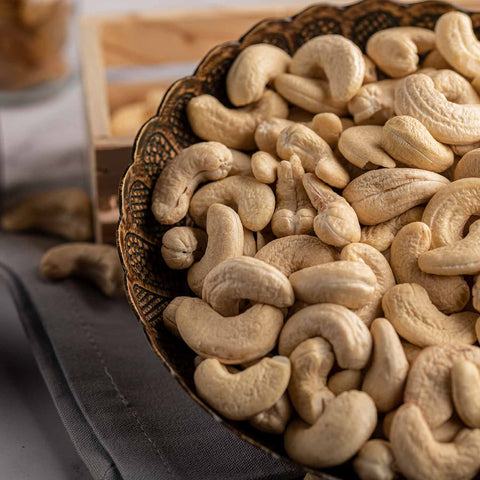
Benefits:
- Improve heart health by reducing blood pressure and cholesterol levels.
- Promote bone health with high magnesium content.
- Aid in managing weight when eaten in moderation.
1 Ounce Serving:
- Calories: 157
- Protein: 5g
- Fat: 12g
- Carbohydrates: 9g
- Fiber: 1g
- Sugar: 2g
4. Dried Black Raisins:
Dried black raisins are made by drying out black Corinth grapes. They are known for their dark color and sweet and tart flavor. Dried Black Raisins are known for their high sugar content, which provides quick energy. They're also good for digestion and anemia prevention due to their iron content.
Benefits:
- Aid digestion and prevent constipation.
- Increase iron levels, reducing the risk of anemia.
- Support bone health with their high calcium content.
1 Ounce Serving:
- Calories: 85
- Protein: 1g
- Fat: 0g
- Carbohydrates: 22g
- Fiber: 1g
- Sugar: 17g
5. Dried Blueberries:
Dried blueberries are blueberries that have been dehydrated. They maintain many of the fresh fruit's nutrients but in a more concentrated form. Dried Blueberries are packed with antioxidants and vitamins. Despite their high sugar content, they are beneficial for cognitive and heart health.

Benefits:
- High in antioxidants, especially anthocyanins, supporting heart and brain health.
- Improve insulin sensitivity and help in managing diabetes.
- Enhance mood and cognitive functions.
1 Ounce Serving:
- Calories: 100
- Protein: 0g
- Fat: 0.5g
- Carbohydrates: 24g
- Fiber: 2g
- Sugar: 21g
6. Walnut Giri:
Walnut Giri refers to the edible interior of walnuts. These are known for their brain-shaped structure, symbolizing their brain health benefits.Walnut Giri (walnut kernels) are known for their omega-3 fatty acids, which support brain and heart health. They also contain antioxidants that fight inflammation.

Benefits:
- Rich in omega-3 fatty acids, promoting brain health.
- Improve heart health by reducing bad cholesterol.
- Contain antioxidants that help fight oxidative stress.
1 Ounce Serving
- Calories: 185
- Protein: 4g
- Fat: 18g
- Carbohydrates: 4g
- Fiber: 2g
- Sugar: 1g
7. Dried Cranberries:
Dried cranberries are tart, red fruits that have been dehydrated. They're often sweetened to improve their taste. Dried Cranberries are typically sweetened, which increases their sugar content. They're known for preventing urinary tract infections and supporting heart health.

Benefits:
- Prevent urinary tract infections and improve bladder health.
- Rich in vitamin C and E, supporting immune function.
- Promote heart health through high antioxidant content.
1 Ounce Serving:
- Calories: 33
- Protein: 0g
- Fat: 0g
- Carbohydrates: 9g
- Fiber: 1g
- Sugar: 8g
8. Raisins:
Raisins are dried grapes. They come in a range of colors and sizes and are a staple in many diets worldwide. Raisins are a great source of energy, fiber, and minerals. They aid in digestion and are beneficial for bone health due to their calcium content.

Benefits:
- Aid in digestion and help prevent constipation.
- Rich in iron, helping to combat fatigue and anemia.
- Contain antioxidants that fight free radicals and promote skin health.
1 Ounce Serving:
- Calories: 85
- Protein: 1g
- Fat: 0g
- Carbohydrates: 22g
- Fiber: 1g
- Sugar: 17g
9. Dried Anjeer (Figs):
Dried anjeer or figs are high in fiber and nutrients. They have a unique, sweet taste and are used in various culinary dishes. Dried Anjeer or figs are high in fiber and a good source of minerals, including potassium, magnesium, and calcium. They're excellent for digestive health and maintaining a healthy blood pressure.
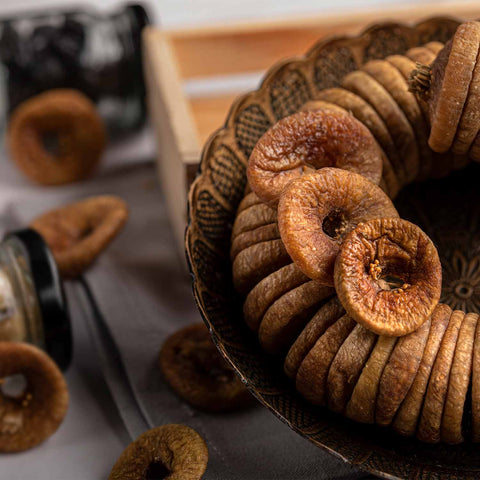
Benefits:
- High fiber content aids in healthy digestion.
- Rich in potassium, helping to control blood pressure.
- Provide a good source of calcium for bone strength.
1 Ounce Serving:
- Calories: 70
- Protein: 1g
- Fat: 0.3g
- Carbohydrates: 18g
- Fiber: 3g
- Sugar: 15g
10. Pistachios:
Pistachios are not only tasty but also packed with nutrients. They're known for their vibrant green color and unique flavor. Pistachios are not only tasty but also packed with nutrients. They help promote gut health, reduce heart disease risk, and are an excellent snack for managing weight and blood sugar levels.
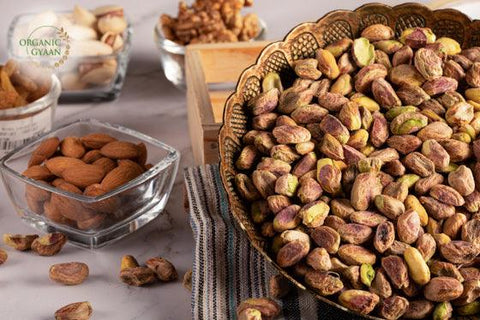
Benefits:
- Promote healthy gut bacteria due to their fiber content.
- May lower cholesterol and blood pressure, supporting heart health.
- Enhance blood sugar control, which is beneficial for diabetes management.
1 Ounce Serving:
- Calories: 159
- Protein: 6g
- Fat: 13g
- Carbohydrates: 8g
- Fiber: 3g
- Sugar: 2g
Incorporating these dry fruits into your diet can provide various health benefits, but remember to keep track of their sugar and calorie content, especially if you are monitoring your intake for health reasons.
Conclusion
In conclusion, dry fruits are a convenient and nutritious choice for snacking, packed with essential nutrients beneficial for health. They provide a variety of vitamins, minerals, and fibers while also being delicious. However, moderation is essential due to their high sugar and calorie content. By incorporating these dry fruits into your diet thoughtfully, you can enjoy their health benefits without overindulging. Remember, a balanced approach is the key to enjoying the rich nutritional bounty that dry fruits have to offer.


